The 1st International Conference on Arts-Based Educational Research: Art and Democracy was born in this context of urgency and opportunity, with the aim of consolidating ABER as a benchmark methodological field in the educational and social spheres. In particular, this conference aims to encourage its development in the Spanish context, where, despite advances in critical pedagogies and transformative artistic practices, there is still limited integration of arts-based research as a widely recognized and applied methodology.
The main objective is to explore how arts-based educational research can generate and evaluate new forms of social engagement and community activism on European democracy, addressing complex issues such as inequality, human rights, and sustainability from critical and inclusive perspectives. Presenting the latest contributions from the scientific community through examples of successful initiatives where the integration of art into educational projects has generated significant changes in improving school coexistence, empowering marginalized communities, raising awareness of social problems, and breaking down prejudices toward vulnerable groups. Idiosyncratic initiatives and projects using this ABER methodology are expected to be presented, as well as the evaluation of participatory methodologies and collaborative projects capable of promoting democratic values.
The project focuses on transdisciplinary methodologies and their impact on university student learning and on reflective and creative thinking as a key to personal and professional development.
The project aims to offer students of Philosophy and Social Sciences a multidisciplinary and transversal training opportunity in contemporary problems of art and its relationship with today's society from the perspective of philosophy and sociology. The innovative nature of the project is focused above all on breaking down the barriers between, on the one hand, the way of approaching art and society from the aesthetics or philosophy of art and, on the other hand, from sociology, thus promoting, by breaking down the barriers between these two approaches, a transversal and interdisciplinary thinking.
Second Round is a consolidated innovation project (linked to the Consolidated Group GCID23_2584190) focused on promoting artistic education in the world of Secondary Education. During the 2024-2025 academic year we want to continue with the “Second Round: Art and Fight for Secondary Education” Project, after 9 consecutive editions, focusing on heritage education as the axis of our contributions, promoting alliances with institutions that defend heritage education, both secondary schools, museums, interpretation spaces and heritage environments. The fact of focusing on the subject is reinforced by the numerous actions we carry out working in the field of heritage education. We reinforce the study on the subject by organizing the 1st International Congress DECHADOS. Museums, Education Creativity in October 2024. All these initiatives make the University of Valencia an international benchmark for educational innovation in heritage and heritage education. It is essential to collaborate with secondary schools to support the incorporation of innovative theories and practices, as well as knowledge of the learning possibilities that exist in heritage environments. We believe that education should not be left out of the innovations that we are experiencing at a social, cultural and political level, paying attention to teacher training, through the Master's Degree in Secondary School Teacher Training. We are also concerned with maintaining the ongoing training of secondary school teachers, both in the specialty of drawing and in all other specialties interested in heritage education.
The COMETA educational innovation project aims to promote the acquisition of professional teaching skills by using active methodologies in the initial training of teachers. It is designed to bring the training that students receive at university closer to the real demands of the educational system, society and the labour market through active teaching methodologies such as Design Thinking and Podcast to develop key skills. Fundamentally, skills in linguistic, multilingual, digital, personal, social and learning-to-learn communication, citizenship, entrepreneurship and cultural awareness and expression will be promoted.
The mismatch between university education and the labour market has been highlighted in several studies and continues to be a problem today. That is why, to the extent of our possibilities and as those responsible for the academic training of future teachers, we aim to offer students up-to-date, useful and quality training.
The need for greater connection between higher education institutions and professional work institutions (companies, media, educational, cultural or social entities) has led to a paradigm shift in teaching methodologies, so that the aim is no longer to simply transmit content but to apply it in a real environment, while promoting the development of student competences. This proposal is adapted to the training of teachers in different subjects of the degree in Early Childhood and Primary Education Teachers and to the Masters in Secondary Education Teaching and Specific Didactics of the University of Valencia. During the 2024-25 academic year, it will be extended to the students of the Degree in Journalism at the University of Valencia.
AECIAT brings a new comprehensive and contextualised approach to the Ainu collections in the UK.The UK has thesecond largest collections in Europe,12.75% of the total, comprised of 864 items (in at least 8 museums). AECIAT adopts an innovative transcultural and interdisciplinary perspective for the study of these collections,seeking to interrogate images in relation artefacts and written texts.The general goal is to contextualise images and provide a more accurate and updated interpretations and examine how they are related to other artefacts and written texts in the collections.
In these sessions we analyse the growing importance that articles published in research journals have acquired, with the intention of reaching interesting conclusions within what this trend implies in the fields of culture, arts, education and the pedagogical use of these publications specialised in art and education. The meeting will allow us to bring together in Valencia those responsible for prestigious journals in the field of academic publications. There is an explosion of publications, while we see how existing ones are positioned and new titles are created. We need academic meetings like this so that people who do research have face-to-face meetings that encourage reflection and dialogue. They are designed for those people who, both from a professional perspective and from an educational practice, may be interested in analysing the situation and managing future proposals in the field of article publication, the projection of monographs, the specialisation of teams, and everything related to the publishing world and the uses and practices that we carry out, especially in the fields of arts, education and artistic education. We analyze the novelties and new research approaches that these journals offer.
TRAMEVIC (Transnational War-time Memories in East Asian Visual Culture) examines the creation of wartime transnational memories in East Asia through visual culture. The processes of visual remembrance of war-related issues as fluid and changing phenomena that constantly adopt new meaning. The topic is particularly relevant today as it includes unresolved issues that keep conditioning international relations today and regularly cause diplomatic tensions in the region. The project proposes an original transnational and transdisciplinary approach that focuses on how the extensive new usage of images (including films, tv dramas, animation, photos, and other visual material) has allow the representation of a new kind of memory based on often traumatic experiences that expand beyond national boundaries.
TRADIASIA (Transculturality and Diversity in East Asia) seeks to challenge Eurocentric approaches in higher education by expanding the current offering of East Asian Studies at the UV, betting on decolonizing the curriculum through critical theories and postcolonial studies focused on this region, promoting new ways of thinking about the world from the societies and cultures of East Asia.
Tradiasia traces the complexity of East Asian cultures and histories, proposing new approaches that examine their diversity and cross-cultural elements. It aims to examine interactions in the region that go beyond national borders.


 ABERTURA Congress
ABERTURA Congress
 Transdisciplinarity and reflective and creative thinking through the sustainable development goals in teacher training
Transdisciplinarity and reflective and creative thinking through the sustainable development goals in teacher training
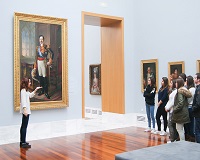 Interpreting society through art: the need to break down the barriers between disciplines
Interpreting society through art: the need to break down the barriers between disciplines
 Second Round: Art and Fight for Secondary Education with Heritage Education
Second Round: Art and Fight for Secondary Education with Heritage Education
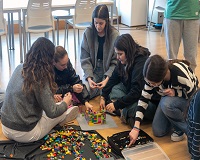 COMETA. Skills with Active Methodologies in teacher training: Design Thinking and Podcast
COMETA. Skills with Active Methodologies in teacher training: Design Thinking and Podcast
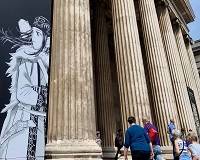 AECIAT Representing the Ainu in European Collections: Images, Artefacts and Texts in the UK
AECIAT Representing the Ainu in European Collections: Images, Artefacts and Texts in the UK
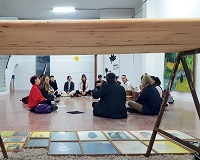 Journals of Art and Education (13th International Conference on Research in Art Education)
Journals of Art and Education (13th International Conference on Research in Art Education)
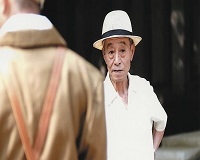 TRAMEVIC Transnational War-time Memories in East Asian Visual Culture
TRAMEVIC Transnational War-time Memories in East Asian Visual Culture
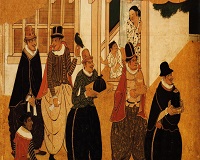 TRADIASIA Transculturality and Diversity in East Asia
TRADIASIA Transculturality and Diversity in East Asia





